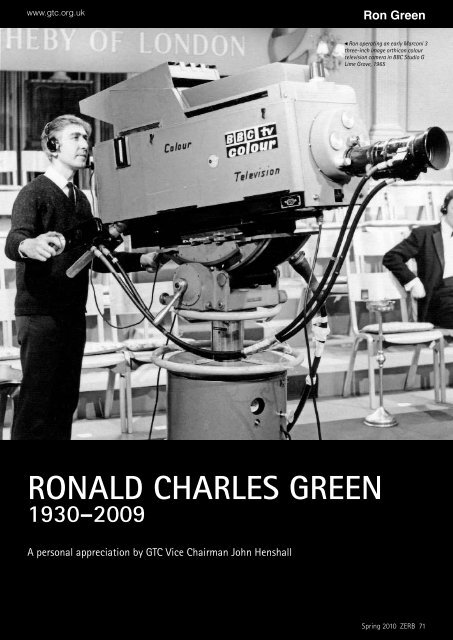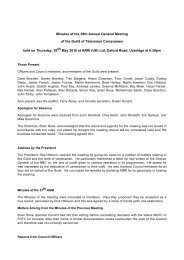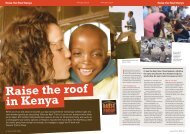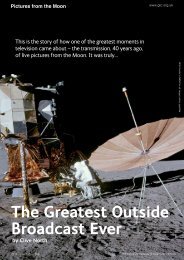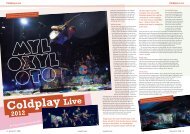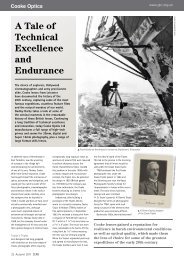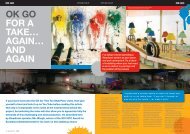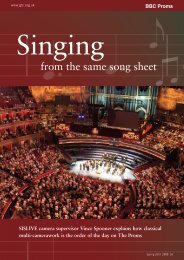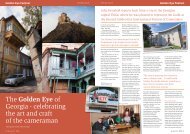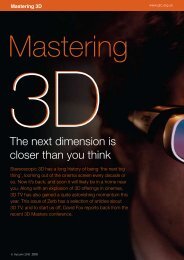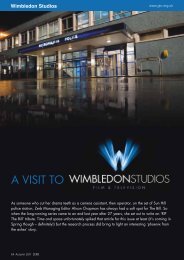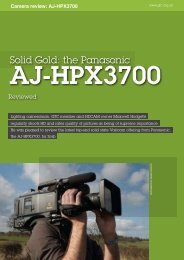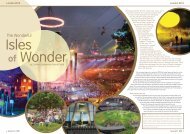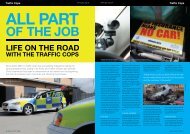RONALD CHARLES GREEN - The Guild of Television Cameramen
RONALD CHARLES GREEN - The Guild of Television Cameramen
RONALD CHARLES GREEN - The Guild of Television Cameramen
Create successful ePaper yourself
Turn your PDF publications into a flip-book with our unique Google optimized e-Paper software.
www.gtc.org.uk Ron Green<br />
<strong>RONALD</strong> <strong>CHARLES</strong> <strong>GREEN</strong><br />
1930–2009<br />
A personal appreciation by GTC Vice Chairman John Henshall<br />
Ron operating an early Marconi 3<br />
three-inch image orthicon colour<br />
television camera in BBC Studio G<br />
Lime Grove, 1965<br />
Spring 2010 ZERB 71
Ron Green<br />
BBC Crew 7 photographed through a Telefex Fisheye 1 lens in 1965. Front<br />
row l to r: Ron Green (Senior Cameraman), Keith Salmon (Camera 2) (both with<br />
thumbs up), John Henshall (Camera 3) (making the sign <strong>of</strong> the Crew 7 film<br />
moonlighter), Peter Leverick (Camera 4) is between Keith and John<br />
Ron Green, the legendary BBC studio<br />
cameraman, died on 22 August 2009.<br />
His funeral service at St Mary’s Church<br />
in Byfleet, Surrey on 1 September<br />
2009 was attended by hundreds <strong>of</strong><br />
his former colleagues – not only from<br />
BBC <strong>Television</strong> Centre, but also from<br />
the ITV companies where he worked<br />
after retirement. A superb eulogy was<br />
delivered by Jim Moir, former Head <strong>of</strong><br />
Light Entertainment, BBC <strong>Television</strong>.<br />
As Ron drove home from work in<br />
1955 he could be certain that the<br />
blue light flickering on the curtains<br />
<strong>of</strong> the houses he passed meant that<br />
the people inside were watching the<br />
output <strong>of</strong> his new employer: the BBC<br />
<strong>Television</strong> Service.<br />
This certainty didn’t last long,<br />
though. From 22 September 1955, Ron<br />
could no longer be sure <strong>of</strong> the source<br />
<strong>of</strong> that flickering light for, on that<br />
day, Independent <strong>Television</strong> started<br />
broadcasting in the London area. For<br />
the first time in the history <strong>of</strong> UK<br />
television, there was a choice <strong>of</strong> what<br />
to watch. And it was this event that<br />
had been the catalyst for Ron to move<br />
from testing television sets at Cossor<br />
Electronics to working at the BBC.<br />
Many BBC staff had been persuaded<br />
to move to ITV by the higher salaries<br />
on <strong>of</strong>fer, and so the Corporation was in<br />
urgent need <strong>of</strong> replacement personnel.<br />
Ron spotted a BBC advertisement for<br />
technicians and made his successful<br />
application for a job at its ‘temporary’<br />
television studios at Lime Grove – just<br />
72 Spring 2010 ZERB<br />
down the road from the site in White<br />
City where the world’s first purposebuilt<br />
<strong>Television</strong> Centre was at the<br />
planning stage.<br />
Naturally gifted<br />
Joining the Engineering Division<br />
meant that you might work in any<br />
area <strong>of</strong> engineering or technical<br />
operations but, luckily for BBC<br />
<strong>Television</strong>, Ron found that his hands,<br />
eyes and brain worked together in<br />
“<strong>The</strong>re was a side to Ron which the camera<br />
managers did not know about: a fun – and<br />
somewhat alternative – side”<br />
perfectly coordinated harmony to<br />
make him a superb natural television<br />
cameraman.<br />
<strong>The</strong> ‘Golden Age’ <strong>of</strong> British<br />
television began in the late fifties,<br />
continuing through the sixties and<br />
seventies, and on into the eighties.<br />
Ron Green was a major part <strong>of</strong> that<br />
Golden Age, working on many <strong>of</strong> the<br />
major programmes <strong>of</strong> the era.<br />
Changes came fast at that time. It<br />
became possible to record television<br />
on tape; the line standard was<br />
increased by over 50 percent from 405<br />
to 625 – the bandwidth doubled; a<br />
second BBC channel was added and<br />
colour came along. Multi-camera<br />
studio-based light entertainment,<br />
drama and opera were raised to new<br />
art forms and Ron Green’s immense<br />
skills were a major contribution in all<br />
<strong>of</strong> these specialist areas.<br />
In those days, a television crew was<br />
a very special amalgam <strong>of</strong> individual<br />
personalities and skills moulded into<br />
a highly cohesive and motivated<br />
team, working as one. Leadership <strong>of</strong><br />
such a team required skills that few<br />
people possessed in the necessary<br />
quantity and quality. Ron Green had<br />
the required qualities in abundance.<br />
Without doubt he was one <strong>of</strong> the very<br />
finest senior cameramen in the history<br />
<strong>of</strong> television. And he was also one <strong>of</strong><br />
the nicest people you could wish to<br />
meet, always with a smile and twinkle<br />
in his eye.<br />
Ron’s opportunity to demonstrate<br />
his leadership skills came when he<br />
was promoted due to the coincident<br />
arrival on the scene <strong>of</strong> two national<br />
treasures: the BBC’s second channel,<br />
BBC2, and – rather bizarrely – a<br />
lovable little bear. Senior Cameraman<br />
Michael Bond published ‘A Bear<br />
Called Paddington’ in 1958, and then<br />
went on to write a whole series <strong>of</strong><br />
Paddington books. By 1965, these<br />
were so successful that Disney bought<br />
the rights and he gave up his job<br />
with Crew Seven to become a<br />
full-time writer.<br />
At the time when Ron became<br />
Senior Cameraman, the crew would<br />
work on series as diverse as Top <strong>of</strong> the<br />
Pops (which had moved to London<br />
from the BBC’s Dickenson Road<br />
studio in Manchester), <strong>The</strong> Likely Lads,<br />
and Peter Cook and Dudley Moore’s<br />
groundbreaking Not Only But Also. In<br />
the BBC Club bar after these shows,<br />
the conversation would not be about<br />
camerawork but about the much more<br />
important question <strong>of</strong> how many pints<br />
<strong>of</strong> beer could be safely consumed<br />
before exceeding the new drink driving<br />
laws. This was not as irresponsible as<br />
it might seem – some <strong>of</strong> the keg beers<br />
then on sale were said to be so low in<br />
alcohol that they could legally have<br />
been sold in the US during prohibition.<br />
Ron operating an Arriflex 16ST film camera, 1965<br />
www.gtc.org.uk<br />
<strong>The</strong> camera department at BBC<br />
<strong>Television</strong> Centre was a junior section<br />
<strong>of</strong> Technical Operations, supervised<br />
by a Head <strong>of</strong> Cameras and four<br />
Camera Managers whose function it<br />
was to run the crews in a quasi-Civil<br />
Service manner. <strong>The</strong>ir main raison<br />
d’être seemed to be processing<br />
the obligatory secret reports that<br />
managers and supervisors had to<br />
write about those under them. Ron<br />
never really enjoyed writing these<br />
reports, though he seemed to manage<br />
to do so while also paying lip service<br />
to their other rather quirky middle<br />
management requirements.<br />
Ron never needed to crawl to the<br />
camera management because he was<br />
respected by all the really important<br />
people in television – the producers,<br />
directors, designers, floor managers,<br />
production assistants and stars. You<br />
never ever heard anyone criticise<br />
Ron. His interpersonal skills were<br />
exemplary. He was a born leader.<br />
He exuded calm, even in the most<br />
stressful situations. His dedication<br />
to the output <strong>of</strong> BBC <strong>Television</strong> was<br />
total and his camera skills were<br />
breathtaking. <strong>The</strong>re have been<br />
many excellent Senior <strong>Cameramen</strong><br />
but none has ever been better<br />
or a more skilful all-rounder than<br />
Ron Green.<br />
Ron was like an elder brother to<br />
those <strong>of</strong> us who had the privilege <strong>of</strong><br />
working with him. Being on his crew<br />
was like being part <strong>of</strong> his extended<br />
family. He was always patient and<br />
tolerant with trainees. He had a<br />
wonderful way <strong>of</strong> being helpful<br />
and supportive without ever being<br />
patronising. He led by outstanding<br />
personal example. It was, quite simply,<br />
a joy to work with him.
www.gtc.org.uk Ron Green<br />
Ron operating an Arriflex 16ST to film tennis star Ken Rosewall being<br />
interviewed by Martijn Lindenberg at Wembley in 1965. Fishing pole operator Neil<br />
Dormand, sound recordist Roger Twyman, clapper-loader/producer John Henshall<br />
A sense <strong>of</strong> fun<br />
<strong>The</strong>re was a side to Ron which the<br />
camera managers did not know<br />
about though: a fun – and somewhat<br />
alternative – side.<br />
I was at the time married to one<br />
<strong>of</strong> the George Mitchell singers – <strong>of</strong><br />
Black and White Minstrel fame –<br />
and became the choir’s un<strong>of</strong>ficial<br />
photographer when it travelled to<br />
Holland to make a Dutch television<br />
programme. <strong>The</strong>re I met Martijn<br />
Lindenberg, who was tracking the<br />
Heron crane on a programme called<br />
Midavond Serenade. Martijn had<br />
ambitions to become a sports producer<br />
and did later become Head <strong>of</strong> Sport<br />
for the NOS (Nederlandse Omroep<br />
Stichting). One day he contacted<br />
me for a crew in London to shoot<br />
part <strong>of</strong> an Arsenal football match<br />
and interviews with the manager at<br />
Highbury, followed by interviews with<br />
tennis stars Ken Rosewall and Rod<br />
Laver, plus their match at the Empire<br />
Pool, Wembley.<br />
Of course I asked my Senior<br />
Cameraman, Ron Green, how I should<br />
go about arranging this shoot. In<br />
those days – the 1960s – it had to<br />
be on film. Neither Ron nor I had<br />
ever shot film but we did have an<br />
opinion about it. We would watch the<br />
location inserts to the programmes<br />
we shot in the studio and wince at<br />
some <strong>of</strong> the appalling camerawork<br />
from our colleagues at the BBC Film<br />
Unit in Ealing. Ron was convinced we<br />
could do better – and this was our<br />
opportunity to prove it.<br />
Film adventure<br />
Neither <strong>of</strong> us had ever operated a film<br />
camera before and had no idea what<br />
was involved. But this did not deter<br />
Ron. He had an idea. We went down<br />
to the BBC Publications shop by the<br />
front gate <strong>of</strong> <strong>Television</strong> Centre and<br />
purchased the Technical Instruction on<br />
operating an Arriflex 16ST camera. <strong>The</strong><br />
BBC produced excellent ‘TIs’ <strong>of</strong> this<br />
kind, although they were not really<br />
intended to assist staff to ‘moonlight’.<br />
We arranged to rent all the<br />
equipment from Samuelson Film<br />
Service and drove up to Cricklewood<br />
in Ron’s smart Hillman saloon car. Ron<br />
was an avid car enthusiast and had an<br />
enviable collection <strong>of</strong> classics.<br />
“Where’s your truck?” asked the<br />
storeman, pointing to the huge pile<br />
<strong>of</strong> flight cases. So we had to take<br />
everything out <strong>of</strong> the cases to cram it<br />
into Ron’s car. I sat in the passenger<br />
seat with the camera body on my lap.<br />
Back at my flat in Kew, Ron knelt<br />
on the floor in front <strong>of</strong> me, holding<br />
the press-stud bound TI (which<br />
instinctively sprang shut all the time)<br />
open at the page showing how to load<br />
the 400ft magazine, while I fumbled<br />
in the changing bag. It was a bizarre<br />
sight. But it worked.<br />
<strong>The</strong> next day Ron experienced the<br />
creative freedom <strong>of</strong> using a small,<br />
lightweight, handheld and untethered<br />
camera for the first time – through<br />
the turnstiles at Highbury and walking<br />
along the touch line. He was out <strong>of</strong> his<br />
comfort zone, breaking new ground,<br />
and he loved it.<br />
<strong>The</strong> tennis at the Empire Pool<br />
presented a different challenge. <strong>The</strong><br />
noise <strong>of</strong> the unblimped camera in the<br />
empty arena was almost deafening.<br />
We really needed the blimp but, try<br />
as we might, we could not work out<br />
how to fit it. <strong>The</strong> noise would certainly<br />
interrupt the tennis and this would all<br />
be covered by the OB unit shooting<br />
the event for BBC Sport. We would<br />
be rumbled.<br />
Ron had an idea. If OBs were<br />
covering the match it would be<br />
recorded. Ron ‘knew someone’ in<br />
the Eurovision <strong>of</strong>fice at the BBC and<br />
would ring her on Monday.<br />
On the Monday, a 16mm film<br />
telerecording <strong>of</strong> the tennis was made,<br />
processed and sent to Holland as<br />
part <strong>of</strong> the reciprocal arrangement<br />
between European broadcasters.<br />
All the film we shot came out<br />
fine. Edited in Holland, all that<br />
remained was to see the results <strong>of</strong><br />
our work. Should we fly to Holland?<br />
No, Ron ‘knew someone’ at a BBC<br />
Listening Station…<br />
Unfortunately, there was no<br />
television signal coming in from<br />
Holland that night, so Ron never saw<br />
the results <strong>of</strong> his first single camera<br />
shoot. But oh, the fun we had – and<br />
the camera managers never got to<br />
hear about one <strong>of</strong> their top Senior<br />
Cameraman’s first moonlighting job.<br />
This was the Ron Green I will<br />
always remember fondly. Daring, never<br />
afraid to take risks or to break new<br />
ground, yet always highly pr<strong>of</strong>essional.<br />
And there was the other side to the<br />
highly pr<strong>of</strong>essional Ron Green. Fun –<br />
and lots <strong>of</strong> it.<br />
Stealing a Picasso<br />
In the sixties, before colour came to<br />
broadcast television, the BBC had an<br />
experimental colour studio – Studio H<br />
in Lime Grove. This studio came to life<br />
after three minutes <strong>of</strong> blank screen at<br />
the end <strong>of</strong> the day’s transmission. In<br />
1965, Ron’s crew wheeled the huge<br />
Marconi three-tube image orthicon<br />
colour cameras through from Studio H<br />
into Studio G, to cover the UK end <strong>of</strong><br />
a Sotheby’s transatlantic auction <strong>of</strong> a<br />
Picasso painting. That night I<br />
Ron ‘stealing’ a Picasso under the nose <strong>of</strong> Sotheby’s auctioneer Tim Clarke in 1965<br />
Spring 2010 ZERB 73
Ron Green<br />
<strong>The</strong> cast and complete crew <strong>of</strong> <strong>The</strong> Val Doonican Show on stage at the BBC <strong>Television</strong> <strong>The</strong>atre, Christmas 1967. Senior<br />
Cameraman Ron Green is just left <strong>of</strong> centre, beside John Henshall’s wife, singer Margaret Eaves (white dress). John Henshall<br />
(Camera 3) is behind Ron and Alan Kerridge (Camera 2) is to the left <strong>of</strong> John, leaning on the monitor cradle. Val Doonican is<br />
seated on the Mole crane with Camera Assistant Bernard Newnham (who now runs the BBC Technical Operations website<br />
www.tech-ops.co.uk) peeping over his shoulder. Producer/Director John Ammonds (moustache and glasses) is next to Val<br />
74 Spring 2010 ZERB<br />
<strong>The</strong>re’s an App for that<br />
World Aviation Weather – £2.39<br />
Seller: Robert Walker<br />
WorldAviationWX is a quick and easy source <strong>of</strong> information on<br />
weather around the world. Designed for use by travellers, pilots,<br />
dispatchers, aviation enthusiasts and anyone interested in detailed<br />
weather information, it contains a database <strong>of</strong> nearly 7000 airports<br />
and weather reporting sites throughout the world. With just two<br />
finger taps, the user can access current weather and forecast<br />
information for all major airports in 192 countries.<br />
WorldAviationWX uses real-time aviation weather data available<br />
through public sources, and decodes it into an easy-to-read<br />
format which can be used and understood by anyone. Airports are<br />
organised by country, making finding the right location simple.<br />
Forecasts are displayed<br />
with graphical timelines,<br />
making it easy to<br />
visualise the forecast<br />
periods. With one<br />
finger tap, the user<br />
is able to see the<br />
Google map view <strong>of</strong><br />
the airport. Emailing<br />
weather data is also<br />
straightforward.<br />
photographed Ron operating the<br />
early colour camera and also managed<br />
to grab my favourite photograph<br />
ever <strong>of</strong> Ron – creeping away with the<br />
‘stolen’ Picasso right under the nose<br />
<strong>of</strong> the auctioneer. This is the way<br />
I want to remember Ron Green –<br />
enjoying life, enjoying work and<br />
having immense fun.<br />
Ron Green, I will miss you greeting<br />
me with the secret sign <strong>of</strong> the film<br />
moonlighters for Dutch television –<br />
grinning through a film viewfinder<br />
frame formed by your thumbs and<br />
forefingers. Maybe your single-camera<br />
moonlighting for Dutch television<br />
helped when you pioneered the BBC’s<br />
first venture into high definition many<br />
years later – <strong>The</strong> Ginger Tree – for<br />
which you were awarded a welldeserved<br />
BAFTA in 1989.<br />
I will always remember with<br />
gratitude the pr<strong>of</strong>ound influence you<br />
had on my career, and the sheer joy<br />
<strong>of</strong> working with you and being part <strong>of</strong><br />
your televisual family. This I share with<br />
the many other cameramen who had<br />
the honour <strong>of</strong> working with you and<br />
being inspired by you. Thank you Ron.<br />
You really were the very best.<br />
Fact File<br />
John Henshall:<br />
www.epi-centre.com<br />
www.gtc.org.uk<br />
Just some <strong>of</strong><br />
Ron Green’s<br />
credits<br />
Light Entertainment<br />
Top <strong>of</strong> the Pops<br />
Rolf Harris Show<br />
Shirley Bassey<br />
<strong>The</strong> Two Ronnies<br />
Carrot’s Lib<br />
<strong>The</strong> Likely Lads<br />
Three up Two Down<br />
Blackadder<br />
Not Only But Also<br />
<strong>The</strong> Paul Daniels’ Magic Show<br />
Opportunity Knocks<br />
<strong>The</strong> Hot Shoe Show<br />
<strong>The</strong> Des O’Connor Show<br />
Drama<br />
Z Cars<br />
S<strong>of</strong>tly S<strong>of</strong>tly<br />
<strong>The</strong> House <strong>of</strong> Bernarda Alba<br />
Thunder Rock<br />
Strife<br />
Season’s Greetings<br />
Relatively Speaking<br />
By George<br />
Dracula<br />
Jekyll and Hyde<br />
<strong>The</strong> Importance <strong>of</strong> being Earnest<br />
When we are Married<br />
King Lear<br />
Pericles<br />
Arms and the Man<br />
<strong>The</strong> Devil’s Disciple<br />
<strong>The</strong>rese Raquin<br />
War and Peace<br />
Arts<br />
Mass For Man<br />
Points in Space<br />
<strong>The</strong> Love <strong>of</strong> Three Oranges<br />
<strong>The</strong> Beggar’s Opera<br />
Cosi fan Tutti<br />
<strong>The</strong> Ginger Tree<br />
Ron Green (left) with<br />
John Henshall (right) in 1965<br />
For an idea <strong>of</strong> Ron Green’s<br />
outstanding skill on the<br />
Mole crane – complete with<br />
‘how it’s done’, see www.<br />
tech-ops.co.uk/page163.html


